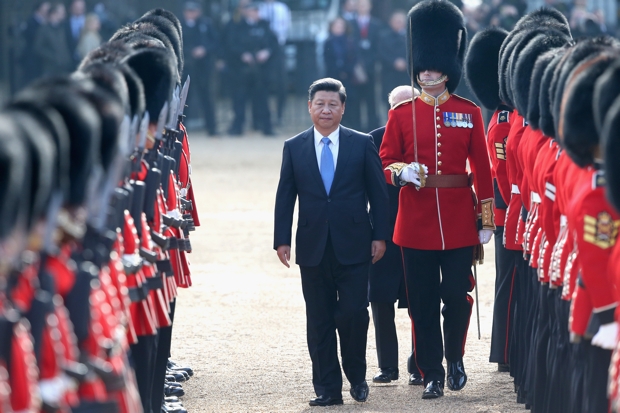If there’s one thing that the James Bond films has taught us it is that the Chinese are not our enemies. We should perhaps remember this as President Xi Jinping polishes his heels on our red carpets this week. Our enemies are cold war Russians, jewel-encrusted North Koreans, ex-Nazi rocket scientists, fat Europeans obsessed with gold, and, of course, bald Polish-Greek crime lords called Ernst with a love of bob sleighs and white cats.
The imminent release of the twenty fourth Bond film is a handy reminder that if we’re looking for threats, we should really look closer to home. What little we know of Spectre‘s plot suggests that it’s another Bond film that avoids mention of China, as befits the career of a secret agent who rarely ventures East despite his first in Oriental languages from Cambridge. You Only Live Twice is still the only film entirely to take place in Asia or, at least, a strange parody of Asia in which Sean Connery thought he could pass for Japanese by simply wearing his wig backwards. In The Man With the Golden Gun, Roger Moore briefly sauntered in his sweat-free safari suit around kickboxing schoolgirls but, again, the landscape was just an exotic backdrop to standard western intrigues involving men with three nipples. In Tomorrow Never Dies, Pierce Brosnan pouted briefly beneath Michelle Yeoh as they rode a motorbike through the streets of Ho Chi Minh City, but that was merely the prelude to a friendly collaboration between MI6 and China’s secret service.
In the James Bond universe, there’s no nation more peace loving than China. A villain is more likely to hail from Greece or Italy than China; the rare exceptions being the Chinese-German Dr No (played in the film by Canadian Joseph Wiseman) and Colonel Sun in the Fleming book of the same name, finished by Kingsley Amis, which involved a communist Chinese plot to kidnap M.
Meanwhile the most famous Asian villains remain Oddjob (Korean in the novel, portrayed by Japanese-American actor Harold Sakata in the movie) and the risible Colonel Moon, portrayed by Toby Stephens, once plastic surgery had turned the North Korean into Gustav Graves, complete with impeccable English accent and a grin like an Aintree winner.
The irony to note in all this is that the Bond movies pride themselves on adapting to geopolitics. They have been quick to pick up on the themes of media ownership, America’s drug wars, post-Glasnost oligarchs, and cyber warfare. The omission of China from major plotlines is odd, perhaps baffling, but, quite obviously, nothing to do with the fact that China is now one of the biggest overseas markets for the Bond franchise. A cynic might argue that any plot casting the Chinese as the bad guys would guarantee a total ban from the mainland, given that even the relatively benign Skyfall was released two months late and missing a scene in which Bond killed a security guard in Shanghai. Indeed, it would take an even greater cynic – John Cleese – to suggest that the Bond films have been culturally realigned to appeal to audiences in the east. He argued last year that ‘the big money was coming from Asia, from the Philippines, Vietnam, Indonesia, where the audiences go to watch the action sequences, and that’s why in my opinion the action sequences go on for too long, and it’s a fundamental flaw’.
Not that any of this should really surprise us. Fleming was a great writer of spy stories but was more prone to fantasy than visionary fiction. The plot of Moonraker (the novel, not the illegitimate Star Wars spin-off) had a foreign power being handed control of a strategic British resource designed to defend England, which they then turned against us in the hope of irradiating the south of the country. It was typical Fleming conceit: great plot for a thriller but completely unbelievable. After all, no government would be foolish enough to hand control of its infrastructure to a foreign agent, even one as friendly as China. Would they?






Comments